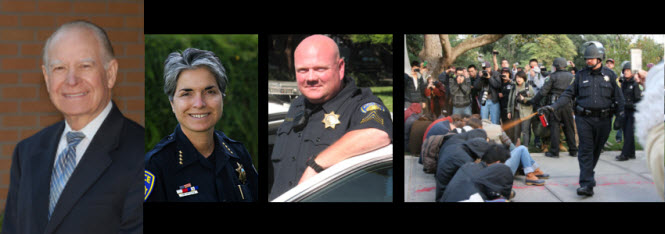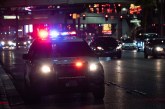
The irony is that the prevention of this report makes it look like the police have something to hide.
Bob Dunning, in a column written March 9, notes that while we all have the presumption of innocence, “the legal machinations currently taking place to keep the Cruz Reynoso pepper-spray report from ever seeing the light of day ill serves the many law-abiding UC Davis police officers who were present on the Quad on that fateful day and were only doing the jobs they were assigned to do…”
He adds, “The Federated University Police Officers Association, taking whatever steps are necessary to protect its own at the expense of the public’s right to know, sought and received a temporary restraining order in Alameda County Superior Court to block last Tuesday’s scheduled release of the long-awaited document…”
Mr. Dunning notes that the union’s attorney, John Bakhit, said, “This isn’t a big secret. Everybody saw what happened. So it’s not like we’re trying to prevent citizens from getting information that they wouldn’t otherwise get.”
But Mr. Dunning is not fooled and writes, “To those of us in the bleacher seats, it appears preventing citizens from getting information is exactly what it you’re trying to do … otherwise, why the court action to block the report’s release? … clearly, there’s something in that report you don’t want us to see…”
In fairness, they took the measures before knowing the content of the report, but seeing as Mr. Bakhit was representing Mr. Pepper Spray himself, Lt. John Pike, it seems only obvious that they knew exactly what was in the report.
Brooke Converse, spokesperson for the University of California Office of the President, told the Vanguard, that neither “the officers, the union nor their lawyers received an advanced copy.”
“Their concerns were based on conjecture on what could be in the report,” she added.
However, “It was decided in court that the lawyers for the union will now receive a copy of the report. They will have a chance to review it under a protection under which prevents them from sharing it with anyone, including their clients.”
Mr. Dunning argues, “Given that the two officers who did the actual pepper-spraying were not even interviewed by Reynoso’s task force, nor was UCD Chief of Police Annette Spicuzza, every officer present that day is now being painted with the same ugly brush of suspicion.”
He continues to say that “they deserve much better than this after cooperating with the Reynoso task force” and, “Legal maneuvers like these, designed to keep the public in the dark about police activities while in the line of duty, do nothing to convince a now-doubting public that members of the UC Davis police force are defenders of truth, justice and the American Way.”
Mr. Dunning then makes reference to the penal code sections we discussion earlier this week, 832.7 and 832.8 which, as he notes, “are rights granted by the Legislature to peace officers in the state, rights that are not available to the rest of us.”
He continues to say that “basically, Section 832.7 says that peace officer personnel records ‘or information obtained from these records, are confidential and shall not be disclosed in any criminal or civil proceeding except by discovery pursuant to Sections 1043 and 1046 of the Evidence Code.’ “
He adds, “In other words, if you or I were interviewed by the Reynoso task force, they could report everything they learned … but, according to the police union, if an officer is interviewed by the task force, that information must remain confidential…”
The UC attorneys, he suggests, “will argue that 832.7 and 832.8 don’t apply in this case because we’re not dealing with personnel files, but it may be an uphill battle…” He continues to say that “whether or not this is bad law is not the point … if it is, it’s up to the Legislature or the people to overturn it … for now, we’re stuck with it, even if the union decides to use it as a shield to prevent the truth from ever coming out..”
On the other hand, he notes that in 832.7, it says, “This section shall not apply to investigations or proceedings concerning the conduct of peace officers or custodial officers, or an agency or department that employs those officers, conducted by a grand jury, a district attorney’s office, or the Attorney General’s office.”
Mr. Dunning notes that “the Reynoso task force is not any of those, but I suppose UC could attempt to argue that it is …”
He also notes that Section 832.8 states, “As used in Section 832.7, ‘personnel records’ means any file maintained under that individual’s name by his or her employing agency and containing records relating to any of the following: a) Personal data; b) Medical history; c) Election of employee benefits; 4) Employee advancement, appraisal or discipline; e) Complaints, or investigations of complaints; f) Any other information the disclosure of which would constitute an unwarranted invasion of personal privacy.”
Mr. Dunning then argues that “interviews with officers conducted by the Reynoso task force appear to be fair game … what is clearly off limits are personnel records of those officers that are maintained by the employer, which Reynoso is not … Reynoso is an investigator, not an employer…”
Another point is that it is not even clear that Kroll had access to any of those kinds of records. From what we understand, they utilized public accounts and statements from non-subject officers, along with emails.
We will see where this ends up. But I think it is difficult to imagine a more damaging turn of events for the officers involved than the highly publicized efforts to suppress this report.
From a PR standpoint, that might be the end of the game itself.
—David M. Greenwald reporting






[quote]From a PR standpoint, that might be the end of the game itself.[/quote]
I doubt it. The court will make a ruling, keeping out anything too personal in nature, but the gist of the report is likely to be publicized would be my guess. This will probably be just a temporary blip…
832.7 and 832.8 disallow disclosure of previous disciplinary actions taken against officers. Surely Officer Pike must have been disciplined for his anti gay epithets which were brought up in the Calvin Chang trial that ended up costing the University $240,000.
Pretty clear that the police union would attempt to hide such actions to protect Pike, and also to protect Spucuzza from being fired for allowing this troubled man to be placed in a position of power after his repeated vile demonstrations of hatred and anger.
I think it’s slightly comical at how bunched some undergarments are getting over this. Delays happen all the time in criminal cases. Here’s the difference, this blog has already convicted the officers.
In other words, you’re all for protecting the rights of people like Topete but consider efforts to protect the rights of police officers as a cover-up.
[quote]this blog has already convicted the officers. [/quote]In my opinion, Pike convicted himself. Given the film footage, no way I could excuse his hosing of the sit-down students. If he truly felt “trapped, he would have sprayed/hosed those on the periphery. Topete is guilty as hell, too. The only question in Topete’s case is whether you think he should have gotten the death penalty or life w/o parole. In either case, in my opinion, Mr Topete should never rejoin society. In my opinion, Mr Pike should be allowed to participate in society, once his actions are properly sanctioned/punished.
hpierce
I think you make an excellent point. In both the Topete and Pike situations, the two are captured on film doing exactly what they chose to do. In the case of Topete, it seems clear that he was acting alone. In the case of Lt.Pike, I think it is equally clear that he was not acting alone. There were people giving orders that he probably interpreted as allowing him to spray the students. In my opinion, this does not exonerate Lt. Pike since he alone is in control and responsible for his own actions.
This in no way means I find the students blameless in this incident, merely that I feel that Lt. Pike had many alternatives available to him, and chose this unfortunate course of action. For that, he is solely responsible.
“In other words, you’re all for protecting the rights of people like Topete but consider efforts to protect the rights of police officers as a cover-up.”
That’s an interesting piece of spin that misses two essential points. First, police are granted special rights over and above everyone else. Second, police are put in a position of tremendous public trust and there is very little ability for the public to oversee their actions. So I don’t see any parallel here to Topete having the right to a fair trial. The police also have the right to a fair trial, however, as long as they operate in a position of public trust, there needs to be oversight.
[quote]This in no way means I find the students blameless in this incident, merely that I feel that Lt. Pike had many alternatives available to him, and chose this unfortunate course of action. For that, he is solely responsible.[/quote]
Where the students without alternatives? I believe the police had less alternatives since they were responsible for the safety of someone who had been arrested.
Mr. Obvious,
I am not stating that the students were without alternatives. They had alternatives. So did Lt. Pike.
Objectively speaking, their chosen course of action did not cause any physical harm to Lt. Pike or to anyone else present. Lt. Pike’s chosen course of action did cause physical, and in my opinion, needless harm to the students.
Again, both sides had choices, both sides chose their course of action. The students choices were without direct physical impact on anyone. Not so the choice of Lt. Pike
I can certainly see how it would look bad for Lt Pike. Then when I take into account entirety of the situation I have a more balanced view.
I base my opinion on the longer video. It appears to me that the officers are attempting to get an arrestee to a parked police car on the sidewalk. The folks on the ground are told to move (I haven’t see anyone make a winning argument that it wan’t a lawful order) and refuse to do so. The folks on the ground are pretty much surrounded on ground by a group of protesters. The protesters are told that force will be used against them if they don’t move. An officer grabs one of the protesters and attempts to physically remove them. That protester physically pulls back while physically being pulled on my another protester. Physical resistance changes the game. If they had been rag dolls on the ground and not moved I would agree 100% that the pepper spray was out of line, unfortunately that wasn’t the case.
Given the totality of the circumstances with the facts that have been presented I can’t side with protesters who actively resisted. The second protester really damaged the passive resistance argument when he grabbed onto and pulled the there protester. Would you have preferred the use of batons?
I 100% agree with the right to protest but believe it was done incorrectly in this situation. I think out of every situation like this lessons can be learned. There will be changes in response to demonstrations and hopefully the protesters learned something as well.
Any comparison between Pike and Topete is truly offensive and particularly so to law officers. There is no way to compare the histories or actions of these two individuals. Whatever you think of Pike, his actions or his attorneys efforts to protect him, none of it comes close to to the crimes of Topete. It is shameful to even use both names in the same sentence.
Mr. Toad
I really must disagree. Comparisons and contrasts are made all the time without implying that the situations are morally equivalent. I do not believe that anyone is suggesting that the two situations bare any moral likenesses.
What is being stated is that each individual is responsible for his own actions and that each of these individuals was filmed in his own act. I really don’t see how these can be construed as anything but factual statements.
And claiming that it is shameful to use both names in the same sentence is, in my opinion, an over the top bit of hyperbole.
Mr. Obvious
“I 100% agree with the right to protest but believe it was done incorrectly in this situation. I think out of every situation like this lessons can be learned. There will be changes in response to demonstrations and hopefully the protesters learned something as well.
I would say that the subsequent protest in which Linda Katehi walked to her car past a single file line of completely peaceful and silent protesters ( which can be viewed by Googling Katehi silent protest) would be an adequate demonstration that at least some of these protestors learned an important lesson about the power of silent, peaceful protest. Now I am awaiting the evidence that campus officials and police have learned their lessons.
[quote]Now I am awaiting the evidence that campus officials and police have learned their lessons. [quote]I’m not sure “the police” had a lesson to learn. We do not see multiple officers hosing the students at close range with pepper spray. If you’re saying police might need to be “heroic”, and in a confrontational situation, physically restraint a commanding officer to stop his outrageous behavior, I would understand your point. I’m betting that there were a number of officers present who abhor what happen, but weren’t in what they thought was a position to intervene.
hpierce
You may be right. By “the police” I would include anyone who was in the chain of command that created the impression that this might be the best course of action, the officers actually performing the spraying, and anyone who might sympathize with this approach. From some of the scenes of officers not in riot gear interacting calmly with the protestors one gets the idea that not all of the police were experiencing the same degree of frustration, threat, challenge to authority, or whatever exactly it was that caused Lt. Pike and the one other officer to act as they did.
Another chant occurs much earlier in this 30 minute video of the incident, after the cops through students down on the ground: “Stop Beating Students. Stop Beating Students.”
https://www.youtube.com/watch?v=6u2fTYUjpmU
Maybe some of the conservative commentators would prefer they chanted “Keep Beating Students. Keep Beating Students.”?
From about 16:15 and especially at 18:25 in the same video:
https://www.youtube.com/watch?v=6u2fTYUjpmU
You can see Officer Pike and another officer communicating on devices in their ears. This is after the officers direction is stopped by the line of students. It seems prudent to wonder if this is the moment they are asking someone at a higher pay grade:
“Can I use pepper spray?” or “here is the situation: what level of force is okay to use?”
I think the report needs to answer this basic question: what is being communicated at this moment? Who is being communicated to?
civil discourse
I think this is an excellent observation and question. Unfortunately, I think that this is precisely what will not be unearthed by the investigation and is most likely to be buried under technicalities. In order to deal effectively with making change in law enforcement policy, transparency is needed, and that is exactly what we most likely will not be seeing unless formal assault charges go forward.
These tactics of delaying and possibly preventing public disclosure of relevant information are, in my opinion, exactly the kind of action that makes law suits by the ACLU and like minded citizens not only inevitable, but
necessary.
[quote]These tactics of delaying and possibly preventing public disclosure of relevant information are, in my opinion, exactly the kind of action that makes law suits by the ACLU and like minded citizens not only inevitable, but necessary.[/quote]
Why not wait until the results of the Reynoso investigation come out before jumping to any conclusions? Obviously there must be something in there pretty penetrating that has caused all this reaction on the part of UCD law enforcement…
Elaine: they had no idea when they filed for the TRO what was in the report.